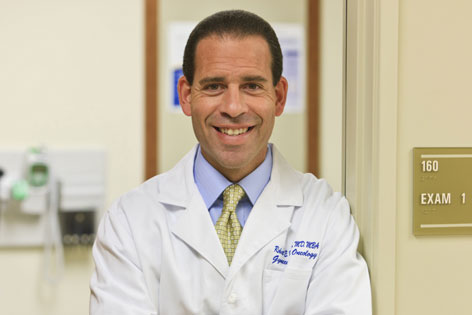
|
Like father, like son

Doctor whose dad was the AMA’s first black president is also a trailblazer – in gynecologic surgery
For the last several years, UC Irvine’s Dr. Robert E. Bristow has been named one of the Best Doctors in America® for gynecologic cancers by Best Doctors Inc. But for much of his life, the medical mastermind in the family was Bristow’s father.
Growing up as the son of a prominent internist in the San Francisco Bay Area, the teenage Bristow spent summers working in his father’s office.
Dr. Lonnie R. Bristow was one of the nation’s first physicians to explore occupational health, carving out a new area of medicine through his study of asbestos exposure. As the first African American president of the American Medical Association, he launched initiatives to improve public health, encourage HIV/AIDS education and require medical schools to offer ethics classes.
"I witnessed firsthand how satisfying it was for him to practice medicine," recalls Bristow, director of gynecologic oncology services for UC Irvine Healthcare. "People would seek him out in the grocery store to thank him for what he did for them."
Originally, Bristow thought he would become an internist like his father. But after taking his first gross anatomy class in medical school, he decided to pursue surgery, eventually becoming one of the country’s foremost gynecologic cancer surgeons and a specialist in robotic procedures.
Robotic systems allow greater precision and more natural movements when performing minimally invasive surgery through keyhole-sized incisions. Conventional laparoscopy requires doctors to completely redirect their hand motions. To tilt the miniature camera scope up, for example, a surgeon must move his or her hand downward.
As surgeons have become more comfortable with robotics, they’re using it for procedures that once required open surgery. Bristow, for instance, is using robotics to perform total hysterectomies—something doctors would never have considered five or 10 years ago. For patients, this generally means decreased pain, less blood loss, shorter hospital stays and speedier recoveries.
"The most gratifying aspect of robotic surgery is seeing patients afterward," Bristow says. "They’ve just had a hysterectomy, and a week or two later, they’re walking around like nothing happened. They’re back to work much faster. There’s less pain and suffering than with traditional surgery. It’s just better all the way around."
Not every patient is a candidate for robotic procedures, he points out. Those who have had major operations or are significantly overweight may still need open surgery.
Bristow has become a trailblazer like his dad, pioneering sophisticated techniques for the management of gynecologic cancers. He’s recognized internationally as a leading expert in ovarian, fallopian tube, primary peritoneal and endometrial oncology. In addition, he has published several books and numerous papers on ovarian cancer.
Recently, he was appointed to the UC Irvine School of Medicine’s Philip J. DiSaia Chair in Gynecologic Oncology, becoming the first holder of the endowed chair named for the university’s highly respected former chief of the Division of Gynecologic Oncology.
"While working as a surgical fellow, I was instilled with a philosophy to continue to grow as a surgeon and clinician, to not be satisfied with a stagnant skill set," Bristow says. "The robotics platform was a natural outgrowth of that. It was a means of expanding my personal repertoire in minimally invasive surgery."
As for his father, Bristow says he is fascinated and impressed by how far technology has advanced during his lifetime. "But," Bristow adds, "he has no plans to perform robot-assisted surgery."
— Amy Paturel and Kristina Lindgren, Healthcare Communications